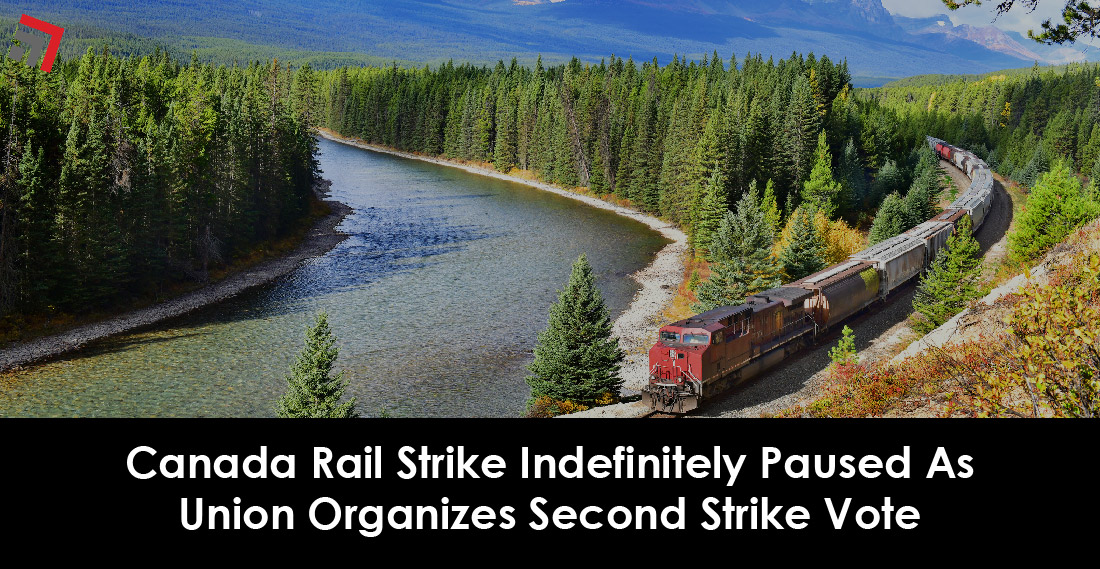While government officials have temporarily curtailed a work stoppage from occurring on Canada’s railroad network, unionized rail workers are still polishing their pickets as negotiations for a labor contract with their railroad-employers stall.
Teamsters Canada Rail Conference (TCRC), the union which represents some 9,000 workers employed by Canada’s two Class I railroads Canadian National and Canadian Pacific Kansas City (CPKC), is gathering its rank-and-file for a strike vote—for the second time.
Titled “Subsequent Strike Vote”, TCRC’s Jun. 11 news release stated: “It is clear we cannot rely on a timely conclusion to these unfortunate circumstances and must protect our rights regardless of outcome. As a result, the TCRC will be conducting a subsequent strike vote beginning Friday June 14th and will run until June 29th.”
Originally, unionized workers voted to authorize a strike earlier on May 1, but on May 13, Canada Labor Minister Seamus O’Regan referred the impasse between the union and railroads to the Canadian Industrial Relations Board (CIRB), a tribunal that rules on labor disputes as it relates to the country’s health and safety. The minister’s tapping of CIRB to review and issue a ruling has indefinitely barred either party—workers and employers—from performing job-related actions, such as a strike or lockout. Until CIRB issues a decision on the impacts a potential strike could have on Canada’s safety, both parties will remain restricted. It remains unclear how long it will take for a decision to be announced.
Related Blog: Canada Rail Workers Vote to Authorize Strike As Soon As May 22
In the event that CIRB rules a strike would not pose a threat to national safety, the possibility of labor action would be back on the table.
That said, in preparation for such an outcome, railroads CN and CPKC have requested an extension of 30 days (from the eventual decision date) before TCRC could announce a strike. The carriers reasoned this timeline is required to properly prepare for subsequent disruptions, but TCRC claims this is not a genuine statement.
In any event, under Canadian law, either party must provide the other 72 hours advanced notice before staging a job-related action. For example, if a strike happened back on May 22, TCRC would have had to publicly issue notice to the railroads on May 19.
Both sides at odds, an agreement unlikely at this time
With no date set on when CIRB will issue a decision, the specter of supply chain disruption in Canada has grown even more haunting. While the threat to freight rail is not immediate, as the option to strike is indefinitely paused, the two sides reaching an agreement, the ultimate assurance of a strike being averted, has been futile. In fact, TCRC and railroads CN and CPKC have only grown more divided.
The negotiations for new collective bargaining agreements began in the fall of last year. At first, the two sides approached the talks cautiously, soon becoming hostile earlier this year, and, as July approaches, seemingly silent.
As the union’s rallying cry for a second strike vote suggests, Canada’s rail workers are discontent with any proposals thus far and likely determined to wage a strike, once possible, to pressure the railroads into deference of their demands. Even if the feasibility of such a tactic is delayed for weeks, even months, there are no signs that either party will compromise between now and then.
As a result, prolonged labor tensions are expected to loom over Canada’s rail network for the foreseeable future as stakeholders sweat palpable dread to what may come.
Related Blog: Canada Rail Workers May Authorize Strike As Labor Talks Stall
Service perspective: Western Canada ports, cross-border movement especially vulnerable
If a strike were to materialize across Canada’s railroads, the impacts would extend beyond intranational supply chains. Such an event would put a chokehold on cross-border shipping between the U.S. and intermodal movement to and from Western Canada’s ports.
Western Canada is heavily dependent on freight rail transport, particularly for cargo to and from the Port of Vancouver, Canada’s largest and busiest trade hub. In fact, railroads regularly move half of the port’s throughput.
While a strike at anytime of the year will prove to be disruptive for Vancouver’s freight movement, this particular strike may find itself occurring at the worst possible time.
Vancouver has already seen railcar shortages this year and, amid rising import demand, the issue has lingered into the summer months as the port braces for North America’s traditional peak season which typically runs from June to late October. With heightened import activity and capacity concerns, the introduction of a rail strike, which could happen within this seasonal window, would create the perfect storm of supply chain chaos.
For U.S. businesses who route orders through the Port of Vancouver, Commerce Express Inc. strongly encourages that they start a dialogue, if they have not already, with their logistics partners on best practices to mitigate and adapt ahead of this evolving labor situation. While the possibility of a rail strike remains indefinitely paused, the lack of progress in a labor contract being forged has undoubtedly raised the chances of freight rail disruption in the near future.
We have an expert ready to talk with you. Start a conversation today.

What’s Commerce Express Inc.’s ENABLE Protocol? Click here!



Recent Comments